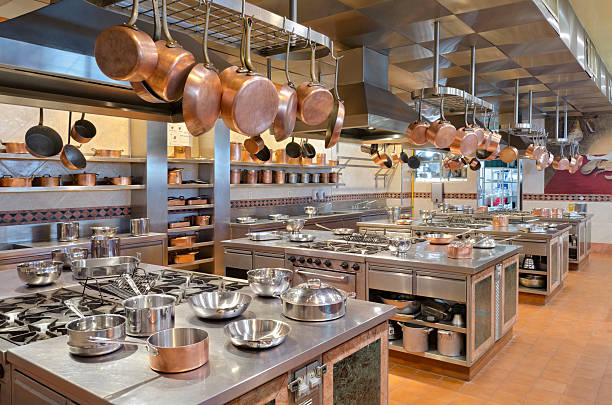Introduction
The restaurant industry is evolving, making sustainable kitchen designs essential. Rising costs and environmental concerns demand energy-efficient solutions, waste reduction, and eco-friendly practices. Restaurant consultants in India help businesses implement green kitchens, optimize resource management, and enhance profitability while reducing their carbon footprint.
1. Why Sustainability Matters in Restaurant Kitchens
Sustainability in restaurant kitchens isn’t just about reducing costs; it’s about protecting the planet. Restaurants consume large amounts of energy and water, contributing to carbon emissions and waste. By leveraging restaurant kitchen design services that prioritize eco-friendly solutions, businesses can minimize their environmental footprint while improving efficiency and customer appeal.
2. Key Elements of a Sustainable Kitchen Design
A truly sustainable kitchen incorporates:
- Energy-efficient appliances to cut down on electricity usage.
- Water-saving solutions to reduce unnecessary consumption.
- Waste management systems to handle food scraps and recyclables responsibly.
- Eco-friendly materials that are durable and sustainable.
3. Energy-Efficient Appliances: The Backbone of a Green Kitchen
In 2025, energy-efficient appliances are a must-have for any restaurant kitchen. Look for:
- Induction cooktops that use less energy than traditional gas stoves.
- LED lighting to reduce electricity consumption.
- Energy Star-rated refrigerators that keep food fresh while using minimal energy.
4. Smart Water Conservation Techniques
Water waste is a big issue in restaurant kitchens. Some effective water-saving techniques include:
- Low-flow faucets to minimize water usage.
- Water recycling systems that repurpose water for non-drinking purposes.
- Sensor-based dishwashers that use only the required amount of water.
5. Waste Management: Reducing, Reusing, Recycling
Proper waste management is key to a sustainable kitchen. Restaurants can:
- Compost food scraps to reduce landfill waste.
- Use biodegradable packaging to cut down on plastic waste.
- Implement a food donation system for surplus meals.
6. Eco-Friendly Kitchen Materials: From Countertops to Flooring
When designing a sustainable kitchen, choosing the right materials matters. Consider:
- Reclaimed wood countertops instead of newly harvested timber.
- Recycled metal or bamboo flooring for durability and sustainability.
- Low-VOC paints and finishes to improve indoor air quality.
7. Innovative Kitchen Layouts for Maximum Efficiency
A well-designed kitchen layout enhances both sustainability and productivity. Restaurants should:
- Use open kitchen designs to improve airflow and reduce cooling costs.
- Optimize storage solutions to minimize food waste.
- Create multi-purpose cooking stations to save space and resources.
8. The Role of Renewable Energy in Sustainable Kitchens
Many restaurants are turning to renewable energy sources such as:
- Solar panels to generate electricity.
- Wind energy for powering kitchen appliances.
- Geothermal heating systems to regulate kitchen temperatures.
9. How Technology is Revolutionizing Green Kitchens
Technology is making it easier than ever to maintain an eco-friendly kitchen. Some game-changing innovations include:
- Smart thermostats that adjust temperature automatically.
- AI-powered inventory management to reduce food waste.
- IoT-enabled appliances that monitor energy consumption in real time.
10. Case Studies: Restaurants Leading the Green Movement
Several restaurants have successfully implemented sustainable kitchen designs. Some notable examples include:
- Farm-to-table restaurants using locally sourced ingredients.
- Zero-waste kitchens that repurpose every scrap.
- Eco-friendly fast-food chains making sustainability mainstream.
Final Thoughts: The Road to a Greener Future
Sustainable kitchen designs are the future of the restaurant industry. With the right restaurant kitchen design services, businesses can save money, improve efficiency, and reduce their environmental impact. Whether you’re a small café owner or managing a high-end restaurant, restaurant consultants in India can help you implement eco-friendly solutions, making sustainability a smart and profitable choice.
FAQs
1. What are the main benefits of a sustainable kitchen design?
Sustainable kitchens reduce energy and water costs, minimize waste, and improve overall efficiency while also benefiting the environment.
2. How expensive is it to transition to a sustainable kitchen?
While some upgrades can be costly upfront, they provide long-term savings through lower utility bills and maintenance costs.
3. What are the best eco-friendly materials for kitchen countertops?
Recycled glass, bamboo, and reclaimed wood are popular sustainable choices for countertops.
4. How can restaurants reduce food waste?
By implementing portion control, composting, and using AI-driven inventory management systems to track expiration dates.
5. Do customers prefer dining at sustainable restaurants?
Yes! Studies show that eco-conscious customers are more likely to support restaurants that prioritize sustainability.
